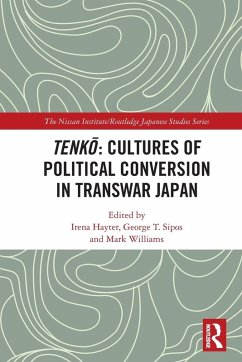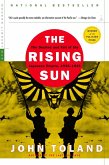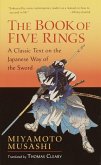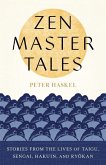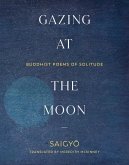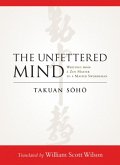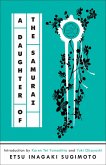Tenk¿
Cultures of Political Conversion in Transwar Japan
Herausgeber: Hayter, Irena; Williams, Mark; Sipos, George T.
Tenk¿
Cultures of Political Conversion in Transwar Japan
Herausgeber: Hayter, Irena; Williams, Mark; Sipos, George T.
- Broschiertes Buch
- Merkliste
- Auf die Merkliste
- Bewerten Bewerten
- Teilen
- Produkt teilen
- Produkterinnerung
- Produkterinnerung
This book approaches the concept of tenko (political conversion) as a response to the global crisis of interwar modernity, as opposed to a distinctly Japanese experience in postwar debates.
Andere Kunden interessierten sich auch für
![The Rising Sun The Rising Sun]() John TolandThe Rising Sun22,99 €
John TolandThe Rising Sun22,99 €![The Book of Five Rings The Book of Five Rings]() Miyamoto MusashiThe Book of Five Rings10,99 €
Miyamoto MusashiThe Book of Five Rings10,99 €![Zen Master Tales: Stories from the Lives of Taigu, Sengai, Hakuin, and Ryokan Zen Master Tales: Stories from the Lives of Taigu, Sengai, Hakuin, and Ryokan]() Peter HaskelZen Master Tales: Stories from the Lives of Taigu, Sengai, Hakuin, and Ryokan18,99 €
Peter HaskelZen Master Tales: Stories from the Lives of Taigu, Sengai, Hakuin, and Ryokan18,99 €![Gazing at the Moon: Buddhist Poems of Solitude Gazing at the Moon: Buddhist Poems of Solitude]() Saigyo SaigyoGazing at the Moon: Buddhist Poems of Solitude15,99 €
Saigyo SaigyoGazing at the Moon: Buddhist Poems of Solitude15,99 €![The Unfettered Mind The Unfettered Mind]() Takuan SohoThe Unfettered Mind17,99 €
Takuan SohoThe Unfettered Mind17,99 €![A Daughter of the Samurai A Daughter of the Samurai]() Etsu Inagaki SugimotoA Daughter of the Samurai15,99 €
Etsu Inagaki SugimotoA Daughter of the Samurai15,99 €![Poetry and Zen: Letters and Uncollected Writings of R. H. Blyth Poetry and Zen: Letters and Uncollected Writings of R. H. Blyth]() R. H. BlythPoetry and Zen: Letters and Uncollected Writings of R. H. Blyth26,99 €
R. H. BlythPoetry and Zen: Letters and Uncollected Writings of R. H. Blyth26,99 €-
-
-
This book approaches the concept of tenko (political conversion) as a response to the global crisis of interwar modernity, as opposed to a distinctly Japanese experience in postwar debates.
Hinweis: Dieser Artikel kann nur an eine deutsche Lieferadresse ausgeliefert werden.
Hinweis: Dieser Artikel kann nur an eine deutsche Lieferadresse ausgeliefert werden.
Produktdetails
- Produktdetails
- Nissan Institute/Routledge Japanese Studies
- Verlag: Taylor & Francis Ltd
- Seitenzahl: 292
- Erscheinungstermin: 17. Juni 2021
- Englisch
- Abmessung: 234mm x 156mm x 16mm
- Gewicht: 456g
- ISBN-13: 9780367770365
- ISBN-10: 0367770369
- Artikelnr.: 61414845
- Herstellerkennzeichnung
- Libri GmbH
- Europaallee 1
- 36244 Bad Hersfeld
- gpsr@libri.de
- Nissan Institute/Routledge Japanese Studies
- Verlag: Taylor & Francis Ltd
- Seitenzahl: 292
- Erscheinungstermin: 17. Juni 2021
- Englisch
- Abmessung: 234mm x 156mm x 16mm
- Gewicht: 456g
- ISBN-13: 9780367770365
- ISBN-10: 0367770369
- Artikelnr.: 61414845
- Herstellerkennzeichnung
- Libri GmbH
- Europaallee 1
- 36244 Bad Hersfeld
- gpsr@libri.de
Irena Hayter is Associate Professor of Japanese Studies at the University of Leeds. Her research brings together domains normally kept apart: literature, visual studies, consumer culture. The overarching concern is with the perceptual changes of the interwar years in Japan and their urban and technological contexts. Articles in positions: asia critique, Japanese Language and Literature and Japan Forum, amongst others, have explored the effects of these changes not only on cultural practices, but also on the politico-ideological domain. Her current monograph project is a media-historical investigation of urban spectacle, technologies of image commodification and literary modernism in interwar Japan. George T. Sipos is Associate Professor at the West University of Timisoara, in Romania, where he teaches Japanese literature, language and culture. His research focuses on modern and contemporary Japanese society and literature from a transcultural perspective, in particular on comparative perspectives on Japan's modernity, modern nation state, activism, and resistance against state oppression. His recent publications include 'Journeys of Political Self-Discovery: The Writings of Miyamoto Yuriko and Panait Istrati from late 1920s Soviet Russia' (Human and Social Studies, 2018), and book chapters on the works of Mishima Yukio (in Mishima Monogatari: Un samurai delle arti, 2020), Kawabata Yasunari and Akutagawa Ry¿nosuke (in¿ Critical Insights: Modern Japanese Literature, 2017). He is currently preparing his first single authored book on Japan's tenk¿¿ and tenk¿ ¿literature, due to be published in 2021 by Routledge. Mark Williams is Vice President for International Academic Exchange at International Christian University in Tokyo, Japan. Until 2017, he was Professor of Japanese Studies at the University of Leeds, UK. He received his PhD in Japanese Literature from the University of California, Berkeley. He has published widely in both English and Japanese - on themes such as Christianity and Japan, the literature of End¿ Sh¿saku and literary representations of the Asia Pacific War.
Part 1: Conceptual Excursions 1. 'Ideological Conversion as Historical Catachresis: Coming to Terms with tenk
' 2. 'The Historical Origins of tenk
as an Intellectual and Social Issue: Marxism - Thought Control - Media' 3. 'Tenk
in Korea: Revealing the Critical Threshold of Colonial Empire' 4. 'Takeuchi Yoshimi and the Problem of tenk
' Part 2: Literary Possibilities 5. 'Literature and Affect: Proletarian Literature as Discovery' 6. 'Common Tropes and Themes in Japan's tenk
Literature' 7. "Doublethink" in Seisan bungaku Theory' 8. "Truth": The tenk
of Nakano Shigeharu and Hayashi Fusao' 9. 'The Disjointed Narratives and Fractured Subjects of Takami Jun' 10. 'Crossing the Void: Shimaki Kensaku's Search for Meaning in "Leprosy" and "Blindness" 11. 'The Tenk
of Anarchist Poets: Agrarian and Cinematic Latencies' 12. 'A Proletarian Writer in the Showcase Window: The Shifting Representation of "the Masses" in Sata Ineko's Kurenai' 13. 'Mythic Reality, Battlefield Survival and Psycho-social Conversion in Yoshida Mitsuru's The End of Battleship Yamato'
' 2. 'The Historical Origins of tenk
as an Intellectual and Social Issue: Marxism - Thought Control - Media' 3. 'Tenk
in Korea: Revealing the Critical Threshold of Colonial Empire' 4. 'Takeuchi Yoshimi and the Problem of tenk
' Part 2: Literary Possibilities 5. 'Literature and Affect: Proletarian Literature as Discovery' 6. 'Common Tropes and Themes in Japan's tenk
Literature' 7. "Doublethink" in Seisan bungaku Theory' 8. "Truth": The tenk
of Nakano Shigeharu and Hayashi Fusao' 9. 'The Disjointed Narratives and Fractured Subjects of Takami Jun' 10. 'Crossing the Void: Shimaki Kensaku's Search for Meaning in "Leprosy" and "Blindness" 11. 'The Tenk
of Anarchist Poets: Agrarian and Cinematic Latencies' 12. 'A Proletarian Writer in the Showcase Window: The Shifting Representation of "the Masses" in Sata Ineko's Kurenai' 13. 'Mythic Reality, Battlefield Survival and Psycho-social Conversion in Yoshida Mitsuru's The End of Battleship Yamato'
Part 1: Conceptual Excursions 1. 'Ideological Conversion as Historical Catachresis: Coming to Terms with tenk
' 2. 'The Historical Origins of tenk
as an Intellectual and Social Issue: Marxism - Thought Control - Media' 3. 'Tenk
in Korea: Revealing the Critical Threshold of Colonial Empire' 4. 'Takeuchi Yoshimi and the Problem of tenk
' Part 2: Literary Possibilities 5. 'Literature and Affect: Proletarian Literature as Discovery' 6. 'Common Tropes and Themes in Japan's tenk
Literature' 7. "Doublethink" in Seisan bungaku Theory' 8. "Truth": The tenk
of Nakano Shigeharu and Hayashi Fusao' 9. 'The Disjointed Narratives and Fractured Subjects of Takami Jun' 10. 'Crossing the Void: Shimaki Kensaku's Search for Meaning in "Leprosy" and "Blindness" 11. 'The Tenk
of Anarchist Poets: Agrarian and Cinematic Latencies' 12. 'A Proletarian Writer in the Showcase Window: The Shifting Representation of "the Masses" in Sata Ineko's Kurenai' 13. 'Mythic Reality, Battlefield Survival and Psycho-social Conversion in Yoshida Mitsuru's The End of Battleship Yamato'
' 2. 'The Historical Origins of tenk
as an Intellectual and Social Issue: Marxism - Thought Control - Media' 3. 'Tenk
in Korea: Revealing the Critical Threshold of Colonial Empire' 4. 'Takeuchi Yoshimi and the Problem of tenk
' Part 2: Literary Possibilities 5. 'Literature and Affect: Proletarian Literature as Discovery' 6. 'Common Tropes and Themes in Japan's tenk
Literature' 7. "Doublethink" in Seisan bungaku Theory' 8. "Truth": The tenk
of Nakano Shigeharu and Hayashi Fusao' 9. 'The Disjointed Narratives and Fractured Subjects of Takami Jun' 10. 'Crossing the Void: Shimaki Kensaku's Search for Meaning in "Leprosy" and "Blindness" 11. 'The Tenk
of Anarchist Poets: Agrarian and Cinematic Latencies' 12. 'A Proletarian Writer in the Showcase Window: The Shifting Representation of "the Masses" in Sata Ineko's Kurenai' 13. 'Mythic Reality, Battlefield Survival and Psycho-social Conversion in Yoshida Mitsuru's The End of Battleship Yamato'

